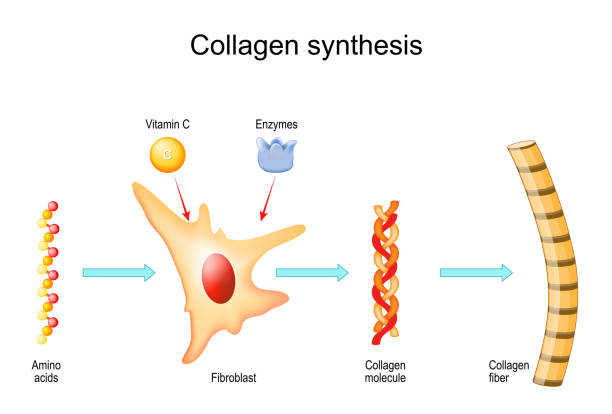Exploring the Impact of Collagen Supplements on Natural Production
Amidst the countless wellness trends, one question that often surfaces is whether taking collagen supplements will cause the body to reduce or stop producing its own collagen. As we delve into this intriguing subject, we find that the body’s natural synthesis of this critical protein plays a vital role in our overall health and appearance. The main concern is whether introducing external sources of collagen may disrupt our internal production. In this comprehensive exploration, we’ll address this concern, review scientific research, and offer a balanced perspective on the use of collagen supplements.
Understanding Collagen and Its Role in the Body

Collagen is a powerhouse protein, revered for its role in maintaining skin elasticity, joint health, and overall tissue integrity. It’s the most abundant protein in our bodies, forming the building blocks of skin, bones, tendons, and ligaments. With age, collagen levels naturally decline, leading to what we often recognize as signs of aging, such as wrinkles and joint pain. Understanding how collagen functions can help us better appreciate the rationale behind supplementing our diets with it and examining its impact on our body’s own collagen productivity.
Collagen Production: How the Body Makes Its Own

The process of collagen production is a complex one, involving various vitamins, minerals, and amino acids acting in concert. Vitamin C, for example, is a key player in the synthesis of collagen; without it, the body cannot form or store this essential protein. Age, poor diet, and harmful lifestyle choices, like smoking, can negatively impact our body’s ability to produce collagen. As we consider supplements, it’s important to understand these natural production mechanisms and how they could potentially be affected.
The Collagen Supplement Boom
Collagen supplements, available in forms like powders, capsules, and drinks, promise to replenish the body’s dwindling supply as we age. Their rising popularity is supported by claims of smoother skin, stronger nails, and more supple joints. Before we can assess their impact, let’s take a closer look at the variety of supplements on the market.
The Science Behind Collagen Supplementation
Clinical trials and research studies have begun to unravel the effects of collagen supplementation on our bodies. Some evidence suggests that these supplements can indeed support the skin’s hydration and elasticity, among other benefits. However, there is a difference between supplementing the body with a protein and the body’s natural synthesis of that protein.
Debunking the Myth: Does Supplemental Collagen Inhibit Natural Production?
The crux of the concern is whether introducing external collagen discourages the body from making its own. Fortunately, research thus far indicates that taking collagen supplements does not inhibit natural collagen production. Instead, these supplements may provide the necessary amino acids that the body uses as building blocks for its own collagen synthesis.
Here’s a quick look at the key components involved in collagen production:
| Nutrient | Role in Collagen Production |
|---|---|
| Vitamin C | Essential for the synthesis of collagen |
| Glycine | A primary amino acid in collagen structure |
| Proline | Another amino acid, aids in collagen stabilization |
Maximizing Collagen Levels: Best Practices
While supplements can provide an additional source, it is also beneficial to support the body’s natural ability to produce collagen. Ensuring a nutrient-rich diet, protecting the skin from excessive sun exposure, and avoiding smoking are just a few ways that can help maintain healthy collagen levels organically.
The decision to take collagen supplements should be a personal one, considering factors such as dietary restrictions, age, and health goals. If you’re contemplating whether to incorporate these supplements into your routine, here are a couple of points to consider:
- Assess your current diet: Is it providing sufficient nutrients for collagen production?
- Understand your skin and joint health needs: Could you benefit from additional support?
Conclusion: Balanced Approach to Collagen Supplementation
To sum up, collagen supplements are unlikely to make your body lazy in its own collagen production. Rather, they can serve as an ally in the quest for maintaining youthfulness and vitality. Like any supplement, they should not be a replacement for a healthy diet and lifestyle but can be part of a comprehensive approach to wellness.
FAQs
1. Is it possible to rely solely on natural ways to boost collagen production?
No, while natural methods are beneficial, they may not fully meet the body’s collagen needs, especially as we age. Supplements can help fill in the gaps.
2. Can taking collagen supplements lead to an excess of collagen in the body?
It’s improbable as the body naturally breaks down and manages excess collagen.
3. Are there any side effects to taking collagen supplements?
Some individuals may experience digestive issues, and people with allergies to certain ingredients should exercise caution.
4. How long does it take to see the effects of collagen supplements?
Results can vary, but studies have shown noticeable improvements within a 4-8 week period.
5. Do vegetarian or vegan alternatives for collagen supplements exist?
Yes, there are plant-based options that provide nutrients to support the body’s natural collagen production process.


